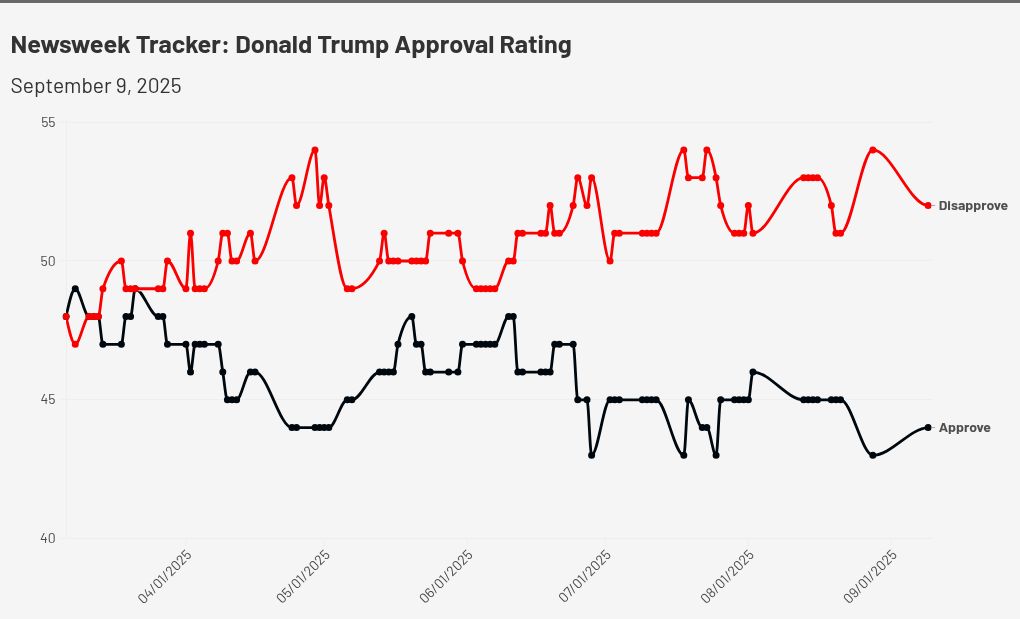Gen Z women hold the most unfavorable view of President Donald Trump compared to any other demographic group, according to a new poll.
The latest NBC News Decision Desk Poll shows that 74 percent of young women disapprove of Trump’s job performance, while just 26 percent approve. That is compared to 53 percent of young men who disapprove of Trump, while 47 percent approve.
Why It Matters
The results suggest that a wide gender gap is still present in U.S. politics, particularly among younger voters.
While Gen Z men show significantly more openness to Donald Trump, Gen Z women remain overwhelmingly opposed, mirroring broader national trends in which women lean more Democratic and men more Republican.
This divide is especially consequential because Gen Z is entering the electorate in large numbers, and their voting patterns could influence the balance of power in upcoming elections.
What To Know
The gender gap also persists across key policy areas. On border security and immigration, 46 percent of Gen Z men approve of Trump’s handling of the issue, while only 24 percent of Gen Z women do.
The divide is also evident in economic and trade policy. Forty-two percent of Gen Z men approve of Trump’s handling of trade, while just 23 percent of women share that view. On inflation and the cost of living, 41 percent of men approve, compared with only 21 percent of women.
Immigration remains the most polarizing issue of all, with 45 percent of men supporting Trump’s deportation policies against just 21 percent of women.
That divergence reflects broader generational anxieties. Gen Z reports higher levels of worry about the future than other generations, but young women carry the bulk of that burden. One-third of women say they feel anxious “almost all of the time,” and another third “most of the time,” compared with fewer than two in ten men who say the same.
Yet despite these divides, Gen Z men and women agree on some fundamentals. Both list a fulfilling job, financial independence, and having enough money to live the life they want as the top markers of success. These shared priorities align with their overwhelming concern about inflation and the cost of living, which four in 10 young adults named as the most important economic issue.
“The Gen Z partisan gender gap is real, but both Trump-voting young men and Harris-voting young women are as likely to define success through financial independence. Any politician serious about this generation should start there,” Rachel Janfaza, founder of The Up and Up, a qualitative research, media, and strategy firm focused on Gen Z, said on X.
The cost of living in the United States has escalated under President Trump’s administration, driven by inflation, tariffs, and housing affordability challenges. Inflation has risen to approximately 3.4 percent annually, influenced by tariffs on imports, which have increased consumer prices by about 2.3 percent in the short term, equating to an average household loss of $3,800.
Additionally, housing costs have surged, with the income required to afford a median-priced home increasing by 70 percent since 2019, now necessitating an annual income of $114,000. These economic pressures are particularly burdensome for Gen Z, many of whom are delaying homeownership and reducing discretionary spending, such as cutting holiday budgets by 23 percent, according to a PricewaterhouseCoopers survey.
Meanwhile, the U.S. jobs market stalled over the summer, adding only 22,000 jobs in August, following a loss of 13,000 in June—the first drop since December 2020. The unemployment rate rose to 4.3 percent, its highest level since 2021, as businesses adjusted to tariff-related disruptions.

Trump’s approval rating has been on the decline in recent weeks. Newsweek’s tracker currently shows that 44 percent approve of his job performance, while 52 percent disapprove, putting his net approval rating at -8 points.
That is a slight improvement from the end of August when his net approval rating hit an all-time low of -11 points.
What Happens Next
Pollsters and analysts noted how the low approvals could affect the political landscape heading into the 2026 midterms, since historical midterm trends have tended to work against the sitting president’s party.
The post Gen Z Women Have Most Unfavorable View of Donald Trump: Poll appeared first on Newsweek.




